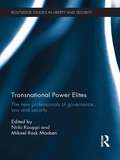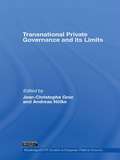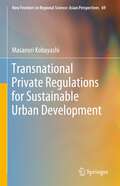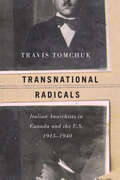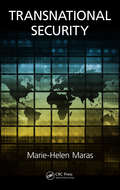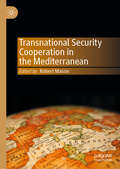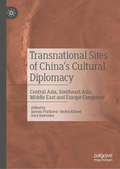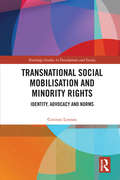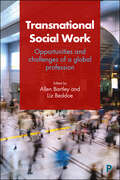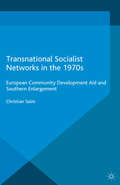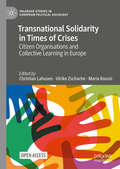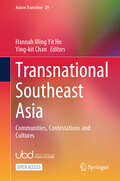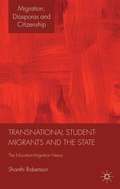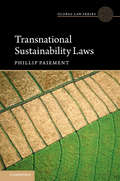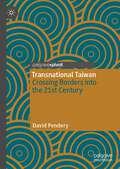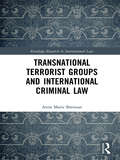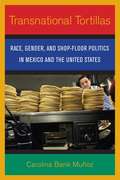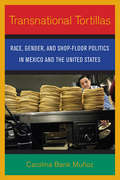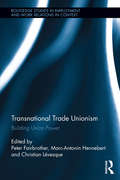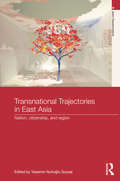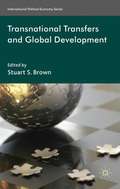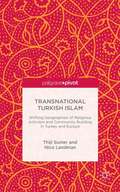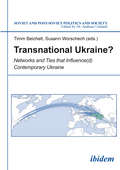- Table View
- List View
Transnational Power Elites: The New Professionals of Governance, Law and Security (Routledge Studies in Liberty and Security)
by Mikael Rask Madsen Niilo KauppiThis book argues that European Union institutional mechanics and the EU as a political unit cannot be properly understood without taking into account the elites that make the policy decisions. Spurred by globalisation, technological and economic development has provided the backbone for social and political transformations that have changed the social structures that unite and differentiate individuals and groups in Europe and their interface with extra-European actors. These developments are not only exemplified by the rise of the EU, but also by the rise of a set of transnational European power elites evolving in and around the European construction. This book maps out these EU and international interdependencies and provides a comprehensive picture of the European transnational power elites. Moving away from the majority of literature on European integration dominated by economics, law, IR and political science, the volume is written from a sociological perspective that takes into account the individuals that make the policy decisions, the formal and informal groups in which s/he is included, as well as the social conventions that regulate political and administrative activities in the EU. This book will be of much interest to students of EU studies, sociology, critical security studies, and IR in general.
Transnational Private Governance and its Limits (Routledge/ECPR Studies in European Political Science #Vol. 51)
by Andreas Nölke Jean-Christophe GrazThis volume explores a variety of forms of transnational private governance where non-state actors cooperate across borders to establish rules and standards accepted as legitimate by other agents. Transnational private governance is a core feature of the devolution of power that we observe in the global realm and that is bringing about new forms of authority. Transnational Private Governance provides theoretically and empirically informed insights into the interactions between states and non-state actors including domains beyond intergovernmental organizations, conventional non-governmental organizations, and multinational enterprises, covering a wide range of arrangements, from highly formal devolutions of power to lax and informal platforms of interaction between private actors. Contributing to the latest generation of globalization studies, the authors consider the relationship between states and markets as closely integrated and seek to broaden the scope of enquiry by including new patterns and agents of change on a transnational basis. This book will be of great interest to researchers and students of political science, international political economy, economics, business studies, globalisation and law.
Transnational Private Regulations for Sustainable Urban Development (New Frontiers in Regional Science: Asian Perspectives #69)
by Masanori KobayashiThis book analyzes the mechanism of transnational private regulations (TPRs) in the global property investment market and the conditions of their effectiveness for sustainable urban development. In the present economy, with control over national legislation alone, state policymakers have been challenged to regulate transnational investors, markets, and issues such as global warming, financial crises, food safety risks, deforestation, and cross-border business transactions. Transgovernmental networks of regulators have assembled representatives and technical experts from national regulatory agencies, nongovernmental organizations, private firms, and business organizations. As private corporations become increasingly globalized, many forms of TPRs have emerged since the 1990s for legislation, standard-setting, monitoring of compliance, and implementation of transnational rules, to respond to challenges posed by the transformation of domestic and international regulatory environments. TPRs are self-regulated, non-state, market-driven regulations. Since the emergence of TPRs, the global rule-making landscape has become dynamic. Urban development and property investment have been viewed historically as local phenomena: The regulations and standards in this field have been established and enforced by governments, local associations, and national professional bodies. However, as urban development and property investment increasingly have been globalized, the services, transactions, and investments by private firms have transcended national boundaries. For this reason, it has become difficult for states to regulate global activities through existing national legislation or international regulatory systems. As the management of new transnational issues through collaborations between various actors is unpredictable, it is necessary to examine the mechanism of TPRs in global property investment and their effectiveness for sustainable urban development.
Transnational Radicals: Italian Anarchists in Canada and the U.S., 1915-1940
by Travis TomchukItalian anarchism emerged in the latter half of the nineteenth century, during that country’s long and bloody unification. Often facing economic hardship and political persecution, many of Italy’s anarchists migrated to North America. Wherever Italian anarchists settled they published journals, engaged in labour and political activism, and attempted to re-create the radical culture of their homeland. Transnational Radicals examines the transnational anarchist movement that existed in Canada and the United States between 1915 and 1940. Against a backdrop of brutal and open class war—with governments calling upon militias to suppress strikes, radicals thrown in jail for publicly speaking against capitalism and the church, and those of foreign birth being deported and even executed for political activities—Italian anarchism was successfully transplanted. Transnationalism made it more difficult for states to destroy groups spread across wide geographical spaces. In Italy and abroad the strong anarchist identity informed by class, ethnicity, and gender reinforced movement values, promoted movement expansion, and assisted mobilization during times of crisis. In Transnational Radicals, Tomchuk makes use of Italian government security files and Italian-language anarchist newspapers to reconstruct a vibrant and little-studied political movement during a tumultuous period of modern North American history.
Transnational Security
by Marie-Helen MarasGlobalization and the easy movement of people, weapons, and toxins across borders has transformed security into a transnational phenomenon. Preventing transnational security threats has proven to be a very difficult challenge for governments and institutions around the world. Transnational Security addresses these issues, which are at the forefront
Transnational Security Cooperation in the Mediterranean
by Robert MasonThis volume draws together academics and think tank experts to explore the revised European Neighborhood Policy (ENP) and EU Global Strategy (EUGS) towards the Southern Neighborhood, in the context of the Arab Uprisings and conflict, counter-terrorism cooperation, the Mediterranean refugee crisis, energy developments in the Eastern Mediterranean, shifting interactions with and between international partners, and the fallout from Covid-19. Covering aspects such as actorness, power and alliances, history, socioeconomics, domestic politics, regime security, and the regional security complex, the authors provide a comprehensive and theoretically rich analysis of EU policy inputs, southern neighborhood interests and responses, as well as new strategy proposals aimed at enhancing human security. The volume will appeal to European and Middle East studies students, international relations scholars and policy professionals alike.
Transnational Sites of China’s Cultural Diplomacy: Central Asia, Southeast Asia, Middle East and Europe Compared
by Gary Rawnsley Jarmila Ptáčková Ondřej KlimešThis edited volume presents the results of a three-year comparative study on Chinese cultural diplomacy (CD) across Europe, Central Asia, the Middle East, and Southeast Asia, which contributes to the broader theoretical debate on China`s increasing soft power in international relations. The study, ‘China's Cultural Diplomacy and the Role of Non-State Actors’ was conducted by a research team at the Oriental Institute of the Academy of Sciences of the Czech Republic from 2015 to 2018. This book pays special attention to China’s localized forms of CD, focusing on the regional variations and involvement of non-state actors, especially local actors outside China. Local actors involved in Chinese CD diplomacy are characterized by their intermediary status as working for the aims of two states, while trying to bridge conflicts and enhance mutual understanding. This book will be of interest to scholars, diplomats, and China watchers.
Transnational Social Mobilisation and Minority Rights: Identity, Advocacy and Norms (Routledge Studies in Development and Society)
by Corinne LennoxThis book explores the ways in which minority groups across the world are reshaping the international minority rights protection system. It documents the actions of four major groups that are using transnational social mobilisation to achieve recognition of their identities and their rights. The result is a greater pluralism in global identity politics and a wide range of new group-specific standards that can inform policies on multiculturalism, political participation, and socio-economic inclusion in the national and international spheres. The book begins by summarising the learning from the global movements of indigenous peoples and Roma. The book then focuses in greater depth on the cases of Afro-descendants in Latin America and of Dalits and caste-affected groups in South Asia and beyond. Each case study shows the historical roots of group-specific transnational mobilisation and how activists have constructed a distinct identity frame out of shared experiences. The book explores key parallels and differences between the discourse, framing strategies, organisational structures and political opportunities used in each case to show which factors have influenced the success or failures of their norm entrepreneurship. The role that international institutions have played in supporting these efforts is given special attention, including intergovernmental bodies such as the UN, the EU and the OAS, and international non-governmental organisations. The UN World Conference Against Racism is explored as a particularly significant political opportunity across the cases. Among academic audiences, this book will appeal to those researching minority rights, social movements, global governance, discrimination and multiculturalism from legal, political, sociological and critical theory perspectives. It will also interest practitioners and activists working on minority rights and the challenges of norm compliance, socio-economic inclusion and governance.
Transnational Social Work: Opportunities and Challenges of a Global Profession
by George Wilson Karen Healy Karen Lyons Annie Pullen-Sansfacon Donna Baines Trish Walsh Helen Simmons Gai Harrison Amy Fulton Erna O'Connor Angelika Papadopoulos Kate Matheson Antoinette Umugwaneza Litea Meo-Sewabu Wheturangi Walsh-Tapiata Sue Hanna Stephanie Ethier Marion Brown Karem LyonsThis unique book provides an international comparison of labour markets, migrant professionals and immigration policies, and their interaction in relation to social work. Case studies based on the latest research from the UK, Ireland, Canada, New Zealand and Australia allow readers to make critical comparisons and gain understanding of the global nature of the social work profession. Detailed analysis covers the opportunities and challenges presented by labour market mobility, the implications for social justice and discussion of the experiences and perceptions of transnational social workers. Essential reading for social work educators, academics and professionals, this book will also inform the development of relevant policy, professional, and educational responses to the phenomenon of transnational social work mobility.
Transnational Socialist Networks in the 1970s: European Community Development Aid and Southern Enlargement (Palgrave Studies in the History of Social Movements)
by Christian SalmTransnational Socialist Networks in the 1970s argues that western European socialist parties' transnational cooperation across national borders significantly influenced politics and policy-making in what was the European Communities (EC). It focuses on the network-like informal structures that characterised transnational cooperation between the party members and leaders of different socialist parties involved in European affairs. Taking the example of two case studies, namely EC development aid policy and EC southern enlargement policy, the book demonstrates that the socialist parties strengthened their informal transnational network structures for the purposes of debating ideological and programmatic issues and finding policy solutions to common challenges in both policy fields. Moreover, it shows that the networks developed various functions to influence European governance. Against this background, the analysis in this book makes not only a significant contribution to the study of transnational networks of western European socialist parties and the history of European integration, but also adds to the understanding of the role of transnational networks in European politics and policy-making.
Transnational Socialist Networks in the 1970s: European Community Development Aid and Southern Enlargement (Palgrave Studies in the History of Social Movements)
by Christian SalmTransnational Socialist Networks in the 1970s argues that western European socialist parties' transnational cooperation across national borders significantly influenced politics and policy-making in what was the European Communities (EC). It focuses on the network-like informal structures that characterised transnational cooperation between the party members and leaders of different socialist parties involved in European affairs. Taking the example of two case studies, namely EC development aid policy and EC southern enlargement policy, the book demonstrates that the socialist parties strengthened their informal transnational network structures for the purposes of debating ideological and programmatic issues and finding policy solutions to common challenges in both policy fields. Moreover, it shows that the networks developed various functions to influence European governance. Against this background, the analysis in this book makes not only a significant contribution to the study of transnational networks of western European socialist parties and the history of European integration, but also adds to the understanding of the role of transnational networks in European politics and policy-making.
Transnational Solidarity in Times of Crises: Citizen Organisations and Collective Learning in Europe (Palgrave Studies in European Political Sociology)
by Christian Lahusen Maria Kousis Ulrike ZschacheThis open access collection is devoted to an in-depth, qualitative analysis of practices of cross-national solidarity in response to the current political and social crises, from citizens’ initiatives to networks of cooperation among civil society actors. The book analyses existing informal groups at the grassroots, furthering transnational solidarity in three thematic areas: disability, unemployment and immigration. Contributions assess how civic groups respond to the various crises affecting Europe, especially the economic and refugee crises, presenting new findings from a systematic comparative study conducted in eight European countries (Denmark, France, Germany, Greece, Italy, Poland, Switzerland, and the UK). The research will be of interest to scholars, students, journalists, policy-makers and activists interested in civil society, social movements, charitable actions, altruism and solidarity, as well as European studies and the socio-economic challenges of current European crises.
Transnational Southeast Asia: Communities, Contestations and Cultures (Asia in Transition #29)
by Hannah Ming Yit Ho Ying-Kit ChanThis open access book presents Southeast Asia as an interesting and conceptually meaningful site to interrogate the transnational paradigm. In featuring research from and across different nations in Southeast Asia, it asks in what ways Southeast Asia lends itself to nuanced applications of transnationalism, and what the wider cultural and collective implications of that might be. Instead of viewing the past and the present as oppositional concepts of time, a temporal continuum is applied to a time-space compression that is fundamental to the workings of the transnational paradigm in the region that we call Southeast Asia. The transnational paradigm, a conceptual tool encompassing various configurations of transnationalism across disciplines, becomes relevant for analysing global cultural flows, but not without due consideration of the nuances shaped by spatio-temporal trends. A paradigm shift in transnationalism from historical connections to contemporary connectivity is afforded by increased mobility and accelerated cultural flows, which have given rise to unprecedented economic productivity in the past century and digital connectivity in the new millennium – a shift that the chapters collectively explore. Relevant to advanced students and scholars across disciplines in the humanities and social sciences, focused on Southeast Asia, this book is a timely exploration that unpicks and unpacks this long-discussed aspect within Asian &‘area studies&’.
Transnational Spaces (Routledge Research in Transnationalism #Vol. 6)
by Peter Jackson Philip Crang Claire DwyerSocial relations in our globalising world are increasingly stretched out across the borders of two or more nation-states. Yet, despite the growing academic interest in transnational economic networks, political movements and cultural forms, too little attention has been paid to the transformations of space that these processes both reflect and reproduce.Transnational Spaces takes a innovative perspective, looking at transnationalism as a social space that can be occupied by a wide range of actors, not all of whom are themselves directly connected to transnational migrant communities.
Transnational Student-Migrants and the State
by Shanthi RobertsonInternational students are often engaged not just in education, but in high stakes towards gaining permanent migration status. This book unpacks the consequences of this education-migration nexus, analyzing migration policies and providing a vivid picture of student-migrants' lived experiences.
Transnational Sustainability Laws (Global Law Series)
by Phillip PaiementTransnational standards related to the environmental and social sustainability of production processes are becoming commonplace governance tools in the global economy. This book demonstrates how sustainability standards serve two fundamentally different functions: coordination and regulation. Standards can coordinate like-minded businesses in an industry by demarcating common sustainability commitments to distinguish between sustainable and unsustainable sectors of the industry. Yet, standards can also regulate businesses, requiring them to change production and trade practices to align with the sustainability demands of third-parties, including trading partners, advocacy groups, consumers and other civil society constituencies. These two functions reflect the private and public lenses, respectively, through which legal scholars can assess standards as transnational sustainability laws. With key case studies in forestry standards, palm oil standards, and the ISEAL Alliance, this book demonstrates how socio-legal analyses of transnational rulemaking inform debates about global administrative law and the constitutionalization of the global economy. Connects transnational legal theory with socio-legal case studies, focusing on actual practices in sustainability governance. Applies a model of two competing functions across three different case studies so readers can understand how the model fits into different contexts and industries. Engages extensively with sociological and political science scholarship, providing a multi-faceted depiction of sustainability standards.
Transnational Taiwan: Crossing Borders into the 21st Century
by David PenderyThis book is a study of transnationalism, focusing on experience of migrants, immigrants, travelers, expatriates, aliens, evacuees, refugees, and nomads in the world, broadly, and Taiwan, particularly. Offering an entirely new framework for what Taiwan as a contested transnational space means for Asia—a heterotopia, in which multiple visions of politics and society can flourish—Dr. Pendery's refreshing vision offers insights for scholars of greater China, international relations, and the economics of the region. Pendery establishes a dialog and debate in the book pitting Samuel P. Huntington, Stephen Toulmin, and Edward W. Said, broadly examining their views of these ideas and issues.
Transnational Terrorist Groups and International Criminal Law (Routledge Research in International Law)
by Anna Marie BrennanAttacks by network-based transnational terrorist groups cause on average 25,000 deaths every year worldwide, with the law enforcement agencies of some states facing many challenges in bringing those responsible to justice. Despite various attempts to codify the law on transnational terrorism since the 1930s, a crime of transnational terrorism under international law remains contested, reflecting concerns regarding the relative importance of prosecuting members of transnational terrorist groups before the International Criminal Court. This book critically examines the limits of international criminal law in bringing members of transnational terrorist groups to justice in the context of changing methods of warfare, drawing from human rights, sociology, and best practices in international criminal justice. Drawing on organisational network theory, Anna Marie Brennan explores the nature of international crimes and assesses the potential for the International Criminal Court to prosecute and investigate alleged crimes perpetrated by members of transnational terrorist groups, paying particular attention to their modus operandi and organisational structure. This book argues that because of the network-based organisational structure of some transnational terrorist groups, achieving justice for victims will prove challenging, in the context of the relationship between the commanders and the subordinate members of the group requiring a re-evaluation of accountability mechanisms at the international level. In advancing an innovative perspective on the accountability of members of transnational terrorist groups, and in offering solutions to current challenges, the book will be of great interest and use to academic, practitioners, and students engaged in the study of terrorism, the ICC, or international humanitarian law.
Transnational Tortillas: Race, Gender, And Shop-floor Politics In Mexico And The United States
by Carolina Bank MuñozThis book looks at the flip side of globalization: How does a company from the Global South behave differently when it also produces in the Global North? A Mexican tortilla company, "Tortimundo," has two production facilities within a hundred miles of each other, but on different sides of the U. S. -Mexico border. The workers at the two factories produce the same product with the same technology, but have significantly different work realities. This "global factory" gives Carolina Bank Munoz an ideal opportunity to reveal how management regimes and company policy on each side of the border apply different strategies to exploit their respective workforces' vulnerabilities. The author's in-depth ethnographic fieldwork shows that the U. S. factory is characterized by an "immigration regime" and the Mexican factory by a "gender regime. " In the California factory, managers use state policy and laws related to immigration status to pit documented and undocumented workers against each other. Undocumented workers are subject to harsher punishment, night-shift work, and lower pay. In the Baja California factory, managers sexually harass women--who make up most of the workforce--and create divisions between light- and dark-skinned women, forcing them to compete for managerial attention, which they understand equates with job security. In describing and analyzing the differences in working conditions between the two plants, Bank Munoz provides important new insights into how, in a globalized economy, managerial strategies for labor control are determined by the interaction of state policies and labor market conditions with race, gender, and class at the point of production.
Transnational Tortillas: Race, Gender, and Shop-Floor Politics in Mexico and the United States
by Carolina Bank MunozThis book looks at the flip side of globalization: How does a company from the Global South behave differently when it also produces in the Global North? A Mexican tortilla company, "Tortimundo," has two production facilities within a hundred miles of each other, but on different sides of the U.S.-Mexico border. The workers at the two factories produce the same product with the same technology, but have significantly different work realities. This "global factory" gives Carolina Bank Muñoz an ideal opportunity to reveal how management regimes and company policy on each side of the border apply different strategies to exploit their respective workforces' vulnerabilities. The author's in-depth ethnographic fieldwork shows that the U.S. factory is characterized by an "immigration regime" and the Mexican factory by a "gender regime." In the California factory, managers use state policy and laws related to immigration status to pit documented and undocumented workers against each other. Undocumented workers are subject to harsher punishment, night-shift work, and lower pay. In the Baja California factory, managers sexually harass women—who make up most of the workforce—and create divisions between light- and dark-skinned women, forcing them to compete for managerial attention, which they understand equates with job security. In describing and analyzing the differences in working conditions between the two plants, Bank Muñoz provides important new insights into how, in a globalized economy, managerial strategies for labor control are determined by the interaction of state policies and labor market conditions with race, gender, and class at the point of production.
Transnational Trade Unionism: Building Union Power (Routledge Studies in Employment and Work Relations in Context #10)
by Peter Fairbrother Marc-Antonin Hennebert Christian LévesqueTransnational trade union action has expanded significantly over the last few decades and has taken a variety of shapes and trajectories. This book is concerned with understanding the spatial extension of trade union action, and in particular the development of new forms of collective mobilization, network-building, and forms of regulation that bridge local and transnational issues. Through the work of leading international specialists, this collection of essays examines the process and dynamic of transnational trade union action and provides analytical and conceptual tools to understand these developments. The research presented here emphasizes that the direction of transnational solidarity remains contested, subject to experimentation and negotiation, and includes studies of often overlooked developments in transition and developing countries with original analyses from the European Union and NAFTA areas. Providing a fresh examination of transnational solidarity, this volume offers neither a romantic or overly optimistic narrative of a borderless unionism, nor does it fall into a fatalistic or pessimistic account of international union solidarity. Through original research conducted at different levels, this book disentangles the processes and dynamics of institution building and challenges the conventional national based forms of unionism that prevailed in the latter half of the twentieth century.
Transnational Trajectories in East Asia: Nation, Citizenship, and Region (Asia's Transformations)
by Yasemin Nuhoḡlu SoysalIn recent decades, East Asia has become increasingly interconnected through trade, investment, migration, and popular culture at regional and global levels. At the same time, the region has seen renewed national assertiveness and nationalist impulses. The book interrogates these seemingly contradictory developments as they bear on the transformations of the nation and citizenship in East Asia. Conventionally, studies on East Asia juxtapose these developments, focusing on the much-exercised dichotomy of the national and transnational. In contrast, this book suggests a different orientation. First, it moves beyond the simplistic view that demarcates the transnational as "the West". Second, it does not view the national and transnational as distinct or contradictory spheres of influence and analysis, but rather, focuses on the interactions between the two, with a view on how these interactions work to transform the ideals and practices of the "good nation", "good society", and "good citizen". The chapters cover a broad range of empirical research--education, science, immigration, multicultural policy, human rights, gender and youth orientations, art and food flows, politics of values and regional identity--which highlight the ways in which the nation is reconfigured, and the relationship between the citizen and (national) collective is redefined, in relation to transnational dynamics and frameworks. Transnational Trajectories in East Asia provides a new perspective on and original analysis of transnational processes, bringing a fresh understanding to developments of the nation and citizenship in the region. It will be of great interest to students and scholars of transnationalization and globalization; comparative citizenship, migration, and multiculturalism; and Asian politics, society, and regionalism.
Transnational Transfers and Global Development
by Stuart S. BrownThis pioneering volume invites scholars from different social science disciplines to contribute their competing perspectives to a far-ranging albeit understudied dimension of globalization. Globalization has been defined as progressively integrated, national product and factor markets, cemented by the revolution in transportation and communications technology. This process has been driven by transnational corporations who have erected intricate, global supply chains. Such commercial advances have, in turn, intensified the interdependence among states and the authors raise a number of questions: Can the multi-variegated, cross-border activities in which such non-state actors engage be analyzed through a single conceptual lens? Can non-state transnational transfers be so clearly distinguished from exchanges in practice? What are the implications of transnational transfers, where material and non-material value is transferred abroad with no assurance, or even expectation of reciprocal compensation, for sovereignty? The case studies range from the impact of worker remittances on failed states to capacity building by global civil society on behalf of nascent NGOs in China to the transfer of security (or insecurity) via peacekeepers, track two diplomats and private security contractors.
Transnational Turkish Islam: Shifting Geographies of Religious Activism and Community Building in Turkey and Europe
by Thijl Sunier Nico LandmanTransnational Turkish Islam provides an overview of Turkish organized Islam in seven European countries. It shows how Turkish Islamic organizations have developed from typical migrant associations in the 1970s and 1980s into present-day European Islamic associations with their own cultural and religious specificities and agendas.
Transnational Ukraine?: Networks and Ties that Influence(d) Contemporary Ukraine (Soviet and Post-Soviet Politics and Society #159)
by Timm Beichelt Susann WorschechThe Euromaidan protests showed Ukraine to be a state between East and West European paths. Ukraine's search for an identity and future is deeply rooted in historical fractures, which indicate its longstanding ties beyond its borders. In this volume, distinguished scholars provide empirical analysis and theoretical reflections on Ukraine's transnational embeddedness, which surfaced with an unexpected intensity in the recent political conflict. The essays have subjects including the role of international media and of diaspora communities in Euromaidan's aftermath, the transnational roots of memory and the search for collective identity, and transnational linkages of elites within Ukrainian political and economic regimes. The anthology demonstrates the theoretical and analytical value of the concept of transnationalism for studying the ambivalent processes of post-Soviet modernization.
